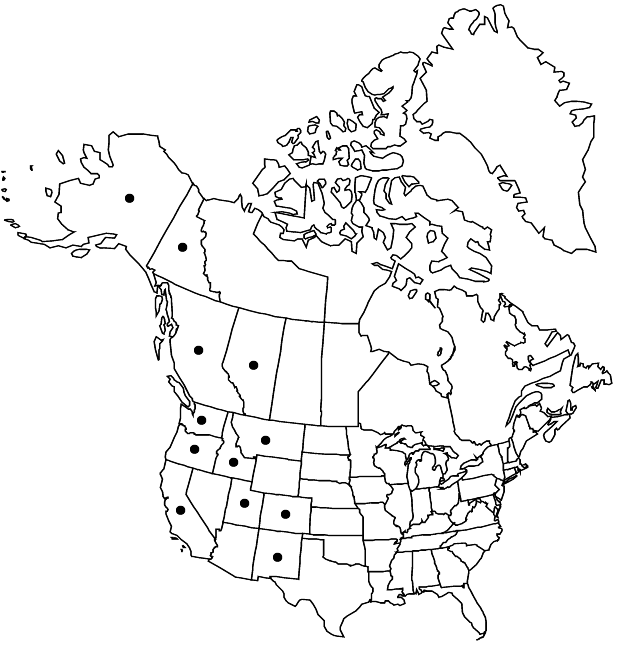Difference between revisions of "Ribes laxiflorum"
Fl. Amer. Sept. 2: 731. 1813 ,.
FNA>Volume Importer |
imported>Volume Importer |
||
| (6 intermediate revisions by 2 users not shown) | |||
| Line 11: | Line 11: | ||
|name=Ribes coloradense | |name=Ribes coloradense | ||
|authority=Coville | |authority=Coville | ||
| + | |rank=species | ||
}} | }} | ||
|hierarchy=Grossulariaceae;Ribes;Ribes laxiflorum | |hierarchy=Grossulariaceae;Ribes;Ribes laxiflorum | ||
| Line 26: | Line 27: | ||
|elevation=0-2600 m | |elevation=0-2600 m | ||
|distribution=Alta.;B.C.;Yukon;Alaska;Calif.;Colo.;Idaho;Mont.;N.Mex.;Oreg.;Utah;Wash.;Asia (Siberia). | |distribution=Alta.;B.C.;Yukon;Alaska;Calif.;Colo.;Idaho;Mont.;N.Mex.;Oreg.;Utah;Wash.;Asia (Siberia). | ||
| − | |discussion=<p>Ribes laxiflorum flowers have stamens with reddish filaments.</p> | + | |discussion=<p><i>Ribes laxiflorum</i> flowers have stamens with reddish filaments.</p> |
|tables= | |tables= | ||
|references= | |references= | ||
| Line 35: | Line 36: | ||
-->{{#Taxon: | -->{{#Taxon: | ||
name=Ribes laxiflorum | name=Ribes laxiflorum | ||
| − | |||
|authority=Pursh | |authority=Pursh | ||
|rank=species | |rank=species | ||
| Line 50: | Line 50: | ||
|publication year= | |publication year= | ||
|special status= | |special status= | ||
| − | |source xml=https:// | + | |source xml=https://bitbucket.org/aafc-mbb/fna-data-curation/src/2e0870ddd59836b60bcf96646a41e87ea5a5943a/coarse_grained_fna_xml/V8/V8_36.xml |
|genus=Ribes | |genus=Ribes | ||
|species=Ribes laxiflorum | |species=Ribes laxiflorum | ||
Latest revision as of 22:43, 5 November 2020
Plants 0.5–1 m (in shade sometimes semiscandent and to 7 m). Stems decumbent, vining, or spreading, finely crisped-puberulent, sparsely subsessile-glandular; spines at nodes absent; prickles on internodes absent. Leaves: petiole (1.5–)2.5–5.5(–8) cm, pubescent, stipitate-glandular; blade orbiculate, 5–7-lobed, cleft nearly 1/2 to midrib, (2.5–)4–12 cm, base deeply cordate, surfaces ± crisped-puberulent at least on veins, usually with some sessile, crystalline glands and more numerous, very short-stipitate, noncrystalline glands abaxially, glabrous adaxially, lobes ovate-triangular, margins shallowly to coarsely 2 times crenate-serrate, apex acute to obtuse. Inflorescences erect or ascending, 6–8-flowered racemes, (2–)3–6(–8) cm, axis stipitate-glandular, flowers evenly spaced. Pedicels jointed, (2.2–)3.2–12 mm, pubescent, red stipitate-glandular; bracts linear to lanceolate-subulate, 0.9–2.8(–3.6) mm, copiously crisped-puberulent, moderately reddish stipitate-glandular. Flowers: hypanthium greenish white with pinkish tinge to red or purple, shallowly bowl-shaped, 0.6–1 mm, pubescent and stipitate-glandular abaxially, glabrous adaxially; sepals not overlapping, spreading, tips usually slightly recurved, greenish white to deep red or purplish, deltate-ovate to oblong-ovate, 2.4–4 mm; petals widely separated, erect, pinkish to reddish or purplish, greenish at apex, reniform or crescent-shaped, not conspicuously revolute or inrolled, 0.9–1.6 mm; nectary disc prominent, cream, reddish, or brownish, flat, 5-lobed, covering ovary; stamens nearly as long as to slightly longer than petals; filaments linear, 1–1.7 mm, glabrous; anthers cream, oval, 0.5–0.7 mm, apex blunt; ovary finely puberulent, prominently reddish stipitate-glandular, (glandular hairs to 0.5 mm); styles connate 1/3–2/3 their lengths, 1.4–1.8 mm, glabrous. Berries palatable, purplish black, ovoid, (4–)5–10(–14) mm, pubescent, reddish purple stipitate-glandular.
Phenology: Flowering Mar–Aug.
Habitat: Moist woods, stream banks, forest edges, clearings, avalanche tracks
Elevation: 0-2600 m
Distribution

Alta., B.C., Yukon, Alaska, Calif., Colo., Idaho, Mont., N.Mex., Oreg., Utah, Wash., Asia (Siberia).
Discussion
Ribes laxiflorum flowers have stamens with reddish filaments.
Selected References
None.